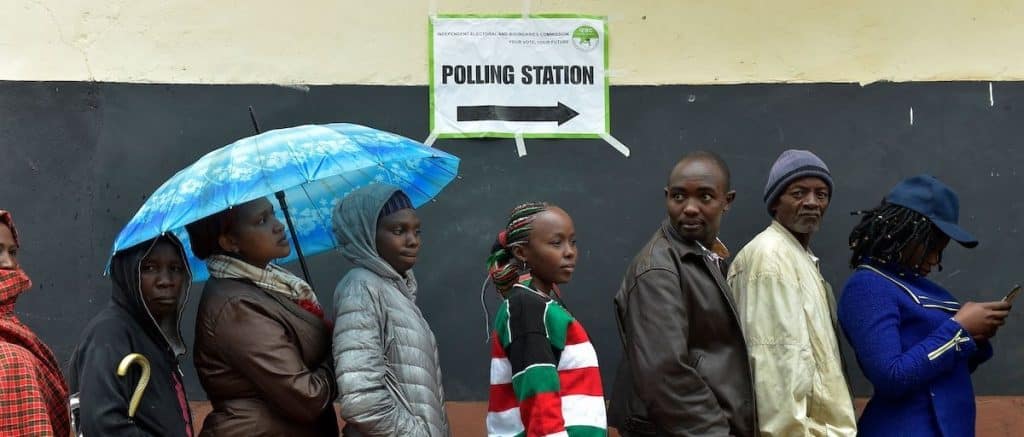
As digital access deepens across Africa, there’s growing evidence of external players weaponising social media platforms to achieve geopolitical ends. Russia’s disinformation campaigns in settings such as Mali in support of coup leaders and against a French military counter-insurgency presence is an example.So when Kenya went to the polls on 9 August, the role of information operations and disinformation campaigns was front of mind. Early indications suggest that social media messaging did shape the highly contested race that resulted in a Supreme Court challenge, which upheld former vice-president Willian Ruto’s victory.The court ruled that there was no election meddling by foreign or local actors, and the Independent Electoral and Boundaries Commission (IEBC) was right in its declaration of the president-elect.But influence is different to direct meddling, and where this influence emanated from online is a topic of research. Although the data still needs careful analysis, ‘any disinformation campaigns seen online in Kenya appear to have been 100% homegrown,’ says Odanga Madung, a data journalist and researcher for the Mozilla Foundation.Kenya’s energetic use of the internet has seen the expansion of digital campaigningA handful of organisations, including the Institute for Security Studies (ISS), is working to understand the role social media narratives played in the August election, and examine the dynamics and entities behind them.Before the polls, the Mozilla Foundation warned that TikTok (a new entrant in the social media market since the last election) was ‘teeming with political disinformation.’ A dusted-down video of a speech by former United States president Barack Obama widely shared on the platform was a flimsy attempt at a ‘cheap fake’. It was quickly recognised as a 2013 speech being passed off as a fresh pre-election message.This is just one example of how social media is being used to distort reality and amplify content. In its defence, TikTok issued election guidelines on Kenya before the August polls to warn users against disinformation.Kenya has a history when it comes to weaponising social media platforms and messaging apps at election time. The now-defunct United Kingdom (UK) firm Cambridge Analytica played a significant role in Kenya’s 2013, and more so 2017, elections working for Uhuru Kenyatta’s campaign.TikTok issued election guidelines before Kenya’s August polls to warn users against disinformationCambridge Analytica staff tapped into the Kenyan electorate’s pre-existing fears and biases, ‘putting information into the bloodstream of the internet’ and ‘giving it a little push every now and again.’ This is according to a former company sub-contractor interviewed in a television investigation that ultimately led to Cambridge Analytica’s banning by UK authorities. Such firms were noticeably absent from the recent polls.
Meanwhile, the acceleration of digitisation and Kenya’s energetic use of the internet have seen the expansion of digital campaigning. Across the continent, social media platforms’ lure of anonymity still enables players to work in the shadows.While disinformation campaigns have been a feature of elections globally, the ability to amplify messages online has enabled the authors or their proxies to reach a wider audience. ISS Consultant Bonface Beti observes that ‘the use of WhatsApp messaging as well as Facebook and Twitter as microblogging sites has been largely employed by rival groups in their divisive quests to win elections.’ In settings where institutions of governance are weak – including the courts and the checks on power offered by traditional media – disinformation campaigns can severely undermine democracies.The attempt to delegitimise results ahead of Kenya’s 5 September Supreme Court judgment on the validity of the elections and the IEBC’s competence was apparently aimed at undermining an institution. Yet Kenya’s Chief Justice Martha Koome’s judgment is being seen as a vote of confidence in the country’s democratic growth.Rather than foreigners, the election campaign revealed a burgeoning industry of Kenyan paid-for influencersIn Kenya’s case, constitutionalism won out. Raila Odinga, the vanquished contender in last month’s poll who was among the Supreme Court petitioners, said he disagreed with the judgment but would respect the rule of law.Rather than foreign players, the election campaign revealed a burgeoning industry of Kenyan paid-for influencers – hired for their social media presence rather than the merit of their arguments. Many on the payroll of election contenders (even opposing candidates at the same time) used their digital footprint to push key messages linked to particular candidates.Nic Cheeseman, a democracy professor at the University of Birmingham and a long-time student of Kenyan politics, warned that there were ‘lots of keyboard warriors out there.’ Cheeseman himself was the focus of what he describes as a ‘misinformation campaign suggesting he was on a “Twitter payroll” for William Ruto’s Kwanza’ coalition. (As opposed to disinformation, misinformation is non-intentional distortion.)Cheeseman agrees that it is ‘patronising’ for the Western world to assume Kenyan leaders and campaigners need foreigners to stir the political pot online. Nevertheless, the possibility of paid-for influencers being used by states rather than politicians to shape conversations online cannot be discounted.As the effects of social media in Kenya’s election are distilled and debated, just how much disinformation is the result of a coordinated operation ‘with a central mastermind’ will be a key question, says Cheeseman. Furthermore, a concerted campaign before elections to educate voters about the perils of disinformation may serve as a model for other African countries.In February 2023, Nigerians head to the polls to elect a new president. As the continent’s most populous nation with a young, social media-hungry demographic, issues of oil, food prices, an Islamist insurgency and ethnic and religious divisions are playing out online.At times these have prompted shutdowns, such as the 2021 Twitter ban. As election day approaches, will these issues attract external actors intent on shaping debates and inflaming tensions? Or will Nigeria repel intrusions into its democratic space and manage domestic disinformation campaigns online?




